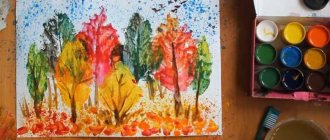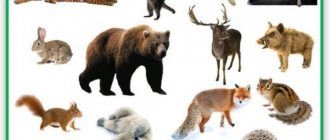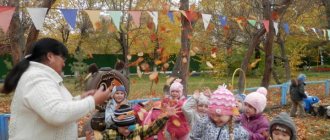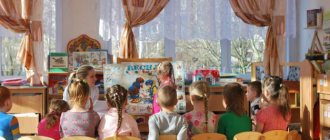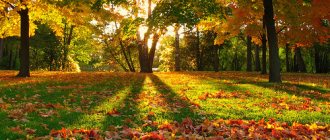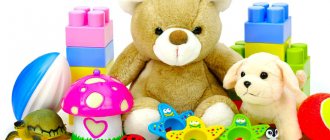Open lesson in the preparatory group of the preschool educational institution “Golden Autumn”
- October 27, 2016
Fast distance online competitions
Competition “Methodological piggy bank of a teacher”
Open lesson “Golden Autumn” in the senior preparatory group of the kindergarten. The lesson is aimed at developing cognitive and aesthetic experience, artistic taste, and a poetic ear through material related to one of the seasons - autumn.
Program content
The child and the world around him.
Natural surroundings. Environmental education
- Observe natural phenomena. Help establish cause-and-effect relationships between natural phenomena. Deepen and concretize ideas about the living conditions of plants and animals.
- Form ideas about wintering and migratory birds.
- Strengthen the ability to find and recognize wintering birds: sparrow, magpie, tit, bullfinch, etc.
- To form an aesthetic attitude towards the surrounding world. Encourage children to reflect their impressions in applications.
- Carry out vocabulary work, expanding and clarifying knowledge about the environment.
Fiction
- Continue to develop an interest in fiction.
- Help listen carefully and interestedly to stories and poems.
- Using various techniques and specially organized pedagogical situations, promote the formation of an emotional attitude towards what is perceived.
Artistic and aesthetic education
- Application
- Strengthen the ability to create images.
- Continue to develop the skills of careful and careful handling of materials.
Preliminary work:
- Looking at paintings about autumn.
- Learning poems.
Material:
- Paintings.
- Fruits, flowers.
- Portrait of autumn.
- Scissors, glue, colored paper, brushes, rags, clothescloths.
- "Tea lounge"
Progress of the lesson
Educator:
“A sad time, the charm of the eyes... Your farewell beauty is pleasant to me. I love the lush nature of withering, Forests dressed in crimson and gold. In their canopy there is noise and the first frosts and distant gray winter thunderstorms.
Now we'll talk about autumn. After what time of year does autumn come?
Children: After summer.
Educator: Name all the months of autumn.
Children: September, October, November.
Pugachev's song "Summer" is playing.
Educator: We can do something so that summer doesn’t end.
Children: You can't.
Child 1: There are 4 seasons in nature: winter, summer, spring, autumn. 12 months. Each season lasts 3 months. Everything in nature is in order: 3 months - winter, 3 months - spring, 3 months - summer, 3 months - autumn. And again all over again, because the sun heats less, not like in the summer. The days have become shorter, the sun shines less.
Educator: All seasons are good, but autumn is especially good.
Examination of paintings depicting periods of autumn.
Educator: Autumn, a festive and colorful time of year, has always pleased poets and artists. Look at the paintings, in which the artists each spoke in their own way about their love for autumn. A true artist is able to feel and understand the mood of nature - joyful or sad, jubilant or calm.
Here, look at how the artist spoke about his love for autumn in his painting.
Examination of the painting “Silence”, art. Podlaski.
Child 1: Autumn has come, the autumn wind howled and tore the yellow leaves from the trees. Leaves flew, swirled and fell to the ground in a multi-colored crimson carpet. Look, there are thin birch trees on the edge of the lake. Near the tallest birch tree there is a table and two benches. Nobody here.
Child 2: And just yesterday my grandfather and I sat on them and admired the lake, picked flowers and picked mushrooms in that green forest over there. Autumn will pass, winter will come, spring, then summer, and grandpa and I will come here again.
Examination of the painting “Evening Bells”, art. Levitan.
Educator: Now pay attention to this picture. Whose bold colors and brushes are these? Which artist brought a miracle? This is Levitan's painting "Evening Bells".
Child: There is indescribable beauty in this picture. All the trees are decorated with gold. Birch trees with long braids, wearing elegant yellow sundresses, look into the quiet river. Beautiful girlfriends are fashionable. What do you hear?
Music sounds: Bell ringing.
Child:
A blue haze looks into the eyes of the log shacks, Over the bluebell meadow the Cathedral rings its bells. The ringing of bells and roundabout, And the ringing of bells. And each bell into the soul Until new joys and strength, Your meadows ring no louder than the Bells of Your Rus'...”
Educator: Indeed, over there in the distance beyond the Kupala River you can see the bell towers of the white monastery. The bell rings at the service and calls people. How to get there? You'll have to swim across the river. The water in the river is clean, transparent, crystal - and everything is reflected in it: the trees, the banks, and the sky.
This is how artists confessed their love for autumn, and this is how Russian poets talked about their love.
Child 1 reads Pleshcheev’s poem “Autumn.”
Child 2 reads Chusovitin’s poem “Autumn Leaf.”
Educator: Many artists fell in love with autumn and painted autumn landscapes, and others painted autumn still lifes.
Child 3:
If you see in the picture Marigolds in a basket Or an aster in crystal Or a chrysanthemum in a vase Or a rose on the table Or all the objects at once - Know that this is a still life.
Child 4:
If you see in the picture a vase of fruit on the table, or a pear or a plum, or a peach to the side. Maybe you saw bunches of grapes here now Or all the fruits at once - Know that this is a still life.
Educator: Here is a living still life, and here is a still life in a painting. You look at a still life, everything on it looks like it’s alive. Ripe grapes, berry after berry. The melon is huge, ripe, yellow, oval. I really want to try it.
September flew by quickly, and October is coming to an end.
Soon white snowstorms will lift the snow from the ground. The cranes are flying away, flying away, flying away. You can’t hear the cuckoo in the grove and the birdhouse is empty. The stork flaps its wings - It flies away, it flies away.
What happens to the birds in the fall?
Children: They fly away to the south.
Educator: Many birds feed on insects, but there are none. So they fly south.
Child 1:
The leaves fly away in the fall, the grasses dry up in the swamps, the birds gather in flocks and are ready to fly away.
Child 2:
And saying goodbye to their native places, With golden birches and willows, They circle for a long time over the forests, Over steep river cliffs.
Child 3:
Come back, birds, in the spring, When the forest is clothed with greenery, Every bush and every tree will rustle with young leaves.
Educator: Autumn is flying away, the birds are flying away, but red autumn will remain in our memory for a long time. And as a memory of autumn, we will leave her portrait in sunny autumn colors.
In an autumn wreath of colorful leaves, in an autumn wreath of fragrant fruits. Let's finish the portrait and decorate our cafe with it, where currant juice with farewell autumn leaves awaits us.
Author: Ekaterina Viktorovna Pershina, teacher of the Children's Preschool Educational Institution Central District of Children's Education - Kindergarten No. 46, Apatity, Murmansk Region.
Goals:
- introduce the genre of fine art - landscape;
- learn to create various images of trees, bushes and grasses using the proposed techniques, develop skills and abilities,
- cultivate a love for nature.
Equipment: album “Landscape”, a collection of children’s drawings from past years, AZ paper on which children previously depicted the earth and sky with pastels, gouache, signets, leaves, soft and hard brushes, a piece of cardboard for spraying.
PROGRESS OF THE CLASS
Stage I. "Psychological entry"
There is a short but wonderful time in the original autumn. The whole day is as if it were crystal, And the evenings are radiant.
Children sing the autumn song “Leaves are Falling” by M. Krasev.
Stage II. "Cognitive-game"
The teacher shows illustrations on the theme “Autumn”, talks with the children about a natural phenomenon called “Indian summer” - this is a short period of time with good weather in early autumn, no rain, blue sky, warm weather, colorful leaves.
Children look at I. Levitan’s landscapes “Evening Bells”, “Golden Autumn”, drawings by their peers from previous years, and remember what autumn colors they saw. Relaxation using music P. Tchaikovsky Seasons “Autumn Song” (we discuss what we presented).
Stage III. "Practical"
We work in color: the game “Who is more” (children must compose as many different shades as possible on the palette).
The teacher invites children to choose autumn colors, golden autumn colors (yellow, purple, burgundy, orange, crimson, brown, ocher) from the many available on the palette, look at the bouquets of leaves they handed in and show those whose colors and shades they liked.
Gymnastics for the eyes: “Catch the Bunny”
The task is given to draw landscapes of golden autumn using the selected techniques. When choosing them, children consider and make their sketches, decide which methods are more attractive, combine and complement them with different prints and shades of color.
Stage IV. "Psychological relief"
Result: lesson analysis. The completed drawings are hung up for viewing. Children come up with names for them and explain them. They tell how their drawings are similar or different from other autumn paintings. The work of each child must be positively assessed. We are making an exhibition: “Autumn”
The teacher reads poem 3. Fedorovskaya “Autumn”:
Autumn spread paint at the edges, quietly brushed across the leaves, the hazel trees turned yellow, and the maples glowed red, in the purple of autumn, only the oak was green. Autumn consoles: Don't regret summer! Look - the grove is dressed in gold!
